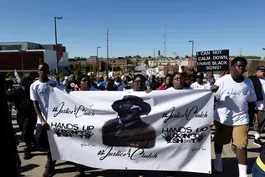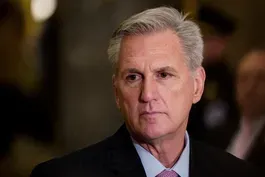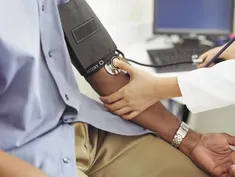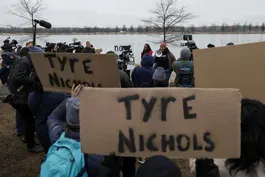
Biden's economic adviser on inflation, possible recession
Clip: 1/31/2023 | 8m 16sVideo has Closed Captions
Biden's top economic adviser on inflation, interest rates and possible recession
We're learning more this week about the strength of the economy and whether high inflation and rising interest rates are pushing it into a recession. The Federal Reserve is expected to raise interest rates by another quarter of a point and the next labor report will show whether job growth is still slowing. National Economic Council Director Brian Deese joined Amna Nawaz to discuss the latest.
Problems with Closed Captions? Closed Captioning Feedback
Problems with Closed Captions? Closed Captioning Feedback
Major corporate funding for the PBS News Hour is provided by BDO, BNSF, Consumer Cellular, American Cruise Lines, and Raymond James. Funding for the PBS NewsHour Weekend is provided by...

Biden's economic adviser on inflation, possible recession
Clip: 1/31/2023 | 8m 16sVideo has Closed Captions
We're learning more this week about the strength of the economy and whether high inflation and rising interest rates are pushing it into a recession. The Federal Reserve is expected to raise interest rates by another quarter of a point and the next labor report will show whether job growth is still slowing. National Economic Council Director Brian Deese joined Amna Nawaz to discuss the latest.
Problems with Closed Captions? Closed Captioning Feedback
How to Watch PBS News Hour
PBS News Hour is available to stream on pbs.org and the free PBS App, available on iPhone, Apple TV, Android TV, Android smartphones, Amazon Fire TV, Amazon Fire Tablet, Roku, Samsung Smart TV, and Vizio.
Providing Support for PBS.org
Learn Moreabout PBS online sponsorshipWe're learning more this week about the strength of the U.S. economy and whether high inflation and rising interest rates are pushing it into a recession.
AMNA NAWAZ: Tomorrow, the Federal Reserve is expected to raise interest rates by another quarter-of-a-point.
On Friday, the next labor report will show whether job growth is slowing even further.
And the showdown over the debt ceiling and the threat of a default this summer is hardly over.
All of that may add to the sense that the economy is on a knife's edge.
But a recession is not a given.
In fact, yesterday, the International Monetary Fund revised its forecast and said it does not anticipate a global recession.
Brian Deese is one of the president's key advisers on all of this.
He's the director of the National Economic Council.
And he joins us now.
Brian Deese, welcome back to the "NewsHour."
Let's begin with that debt ceiling debate.
Tomorrow, President Biden will meet with Speaker McCarthy.
The White House has made very clear the president will release his budget in early March.
We have heard the president call for the speaker to do the same.
But, in your conversations, do you have any sense of what Mr. McCarthy is asking for, where Republicans want to see spending cuts?
BRIAN DEESE, Director, National Economic Council: Well, look, this is precisely the reason why the president has put the emphasis on the need for Speaker McCarthy and the House Republicans to release a budget, release those details, and show that they have a pathway to pass a budget with 218 votes in the House.
That's an important predicate to having a serious conversation about fiscal and economic priorities.
And it's an important moment to do that.
The recent data we have seen in the economy has really been quite promising.
We have seen solid economic growth.
We have one of the strongest labor markets in recent history, the lowest unemployment rate in 50 years, and inflation is coming down.
It's fallen for the last seven months.
Consumers have seen that at the gas pump.
Prices -- price increases are slowing at the grocery store as well.
And we're seeing it in other parts of the economy.
We know what we need to do, keep focusing on reducing prices for consumers, investing in the United States, building more industrial capacity and manufacturing capacity across the United States.
We have all of these goals within our reach.
The last thing that we can afford right now is a self-inflicted wound to try to take our economy backward.
AMNA NAWAZ: But on that meeting tomorrow, Brian, the White House has made clear that raising the debt ceiling is not a negotiation, so why the meeting?
What is it President Biden hopes to get from that face-to-face with Speaker McCarthy?
BRIAN DEESE: Well, look, honoring the full faith and credit of the United States, the obligations that we as a country have already made, should not be a negotiable item.
It hasn't been for prior presidents.
Prior presidents of both political parties, and, in fact, the leaders in the Senate and the House of both political parties today have made clear that this should not be a question.
We should not put the full faith and credit of the United States at risk and at question.
But we can have a serious conversation about economic priorities and fiscal priorities and do that as part of the normal budget process.
And that's what the president is going to focus on.
As you mentioned, he will release his budget.
It will be a detailed blueprint of how he would recommend investing in the country, continuing to make progress on our economic recovery, and bringing down the deficit at the same time.
He's got a set of proposals.
He's happy to look at the proposals when that House Republicans put out their detailed plan.
We should have that conversation as part of the normal budget process.
We should not use the threat of default in a way that we have never done as a country as a way to -- as a bargaining chip or as a way of hostage-taking for particular proposals.
Nobody should be doing that.
AMNA NAWAZ: Let me ask you a little bit about where the economy is right now.
You mentioned some of the progress we have seen.
Unemployment is at a 50-year low, for example.
Inflation does remain a concern and consumer spending has slowed somewhat.
That leads some economists to be a little more worried.
In fact, the National Association of Business Economics surveyed economists, and more than half of them said they believe there's more than a 50/50 chance the U.S. enters a recession this year.
Do you agree with that assessment?
BRIAN DEESE: Well, look, let's step back.
About six months ago, the president came out and said, what we need to see is a transition to more steady and stable growth, where we have resilience in the labor market, and we bring inflation down.
A lot of people at that time were projecting that that wasn't possible and that, in fact, we might see the economy slow down and slide into recession.
Six months later, what we have seen is, the labor market has remained resilient, and, as you said, the unemployment rate continues at a historic low, and inflation has come down for the last six months.
We're making progress on that front.
So, we absolutely can continue to make progress because we have seen it.
We have seen it over the last six months.
We have seen it over the last three months as well.
We have got to keep that progress going.
But that's where priorities matter.
Where the president's focus is now is implementing some of the historic legislation that was passed last year that will bring further price declines for Americans on health care, prescription drugs, clean energy.
These things are in the pipeline and can help people and their pocketbooks in the months ahead.
AMNA NAWAZ: But, Brian, if I may -- I apologize.
I know our time is limited.
Consumer spending is a huge part of our economy, 70 percent of our economy.
That slowdown worries a lot of people.
And a lot of the things that were fueling the resilience you mentioned were things like people getting out after COVID lockdowns and spending a lot of money, right, and federal pandemic funds that were out and about.
Those are gone.
The costs of borrowing are up.
People are lowering -- they have less savings now than they did before.
On consumer spending, in particular, where do you see evidence that will go back up?
BRIAN DEESE: Well, look, just look at the what happened in the fourth quarter of this past year.
We just got the data on it.
We saw solid economic growth, 2.9 percent.
That was driven by solid consumer spending as well.
We are seeing some slowing.
And you would expect that in some areas.
But if you look at household balance sheets, actually, many of the measures of basic economic security are better than they were before the pandemic, credit card delinquencies, bankrupt - - personal bankruptcies, home mortgage delinquencies are all between 10 and 30 percent lower than before the pandemic actually hit.
And that reflects the fact that this has been a remarkable recovery, a historically equitable recovery.
So, look, there are risks on the horizon.
And, certainly, we take nothing for granted.
But if you look at what happened in the fourth quarter of this year, I think that there's reason for cautious optimism, and certainly for staying the course, that we need to keep doing what we know is important, lowering costs for families' balance sheets and encouraging companies to invest more in America, create the kind of jobs that give people opportunities across this country.
AMNA NAWAZ: Brian, when it comes to that optimism, I have to point out the numbers so Americans don't quite share it with you right now, right?
When you look at the latest NBC News poll, people are asked about the economy and the president's handling of it, 36 percent approve, 61 percent disapprove, essentially the same as it was a year ago.
Why do you think that is?
BRIAN DEESE: Look, it's been a very difficult set of years, and consumers are still facing a lot of challenges coming out of the pandemic.
And, certainly, inflation has been a frustration for folks.
I think that the good news for Americans that are watching at home is that we are making real progress in inflation coming down.
Gas prices are down about $1.50 since just the summer.
As I mentioned, food inflation is coming down.
As I mentioned, food inflation is coming down.
And prices of everyday goods and items that seemed like they were out of whack because of some of these pandemics supply chain issues are now coming back into fold.
So, ultimately, the ultimate outcome of the president's economic strategy is going to be, across time, are we building a stronger and more resilient economy in the future?
I think the answer to that is absolutely yes.
We're going to keep our head down and focused on those things that we know matter to American families.
First and foremost of those is continuing to reduce those costs that families face.
AMNA NAWAZ: Brian Deese is the director of the White House National Economic Council.
Brian, always good to talk to you.
Thank you for your time.
Family of man killed by officer discusses police reform
Video has Closed Captions
Clip: 1/31/2023 | 7m 5s | Family of man killed by officer in 2016 describes efforts to reform policing (7m 5s)
House Republicans prepare to start Biden investigations
Video has Closed Captions
Clip: 1/31/2023 | 5m 13s | House Republicans prepare to kick off investigations into Biden White House (5m 13s)
Jake Blount's new twist on Black American folk music
Video has Closed Captions
Clip: 1/31/2023 | 6m 36s | Jake Blount's new twist on Black American folk music (6m 36s)
N.C. Republican explains why he supports Medicaid expansion
Video has Closed Captions
Clip: 1/31/2023 | 5m 2s | N.C. Republican explains why he now supports Medicaid expansion after years of opposing it (5m 2s)
Police tactics under scrutiny in wake of Tyre Nichols death
Video has Closed Captions
Clip: 1/31/2023 | 6m 1s | Police tactics again under scrutiny in wake of killing of Tyre Nichols (6m 1s)
What happens when U.S. COVID emergency measures end in May?
Video has Closed Captions
Clip: 1/31/2023 | 6m 29s | What happens when U.S. COVID emergency measures end in May? (6m 29s)
Providing Support for PBS.org
Learn Moreabout PBS online sponsorshipSupport for PBS provided by:
Major corporate funding for the PBS News Hour is provided by BDO, BNSF, Consumer Cellular, American Cruise Lines, and Raymond James. Funding for the PBS NewsHour Weekend is provided by...

















